Pingtung is probably the most underappreciated of Taiwan’s counties. For most people it is unknown apart from the very touristy beach resort of Kenting. On this two-day trip, remote mountainous areas of the county can be accessed to visit hiking trails, pristine lakes and rivers that offer the perfect respite from the summer heat of the lowlands in Taiwan.
During the summer, cyclists have to be aware of the heat factor. Riding a bike at midday could easily result in heat exhaustion if proper hydration is ignored. Taking this into account, I departed by train from Kaohsiung to Pingtung on a sunny afternoon. This journey is only 20km, but I avoided the afternoon ride through traffic and beat the heat.
Pingtung train station is now a hub for the Taiwan Railways Administration and this mall-like structure is impressive. Starting at 4pm in the afternoon I had a 20km ride to Sandimen Township (山地門). A further 3km up Provincial Highway No 24 took me to Jhongshan Park (中山公園) where I camped for the night. If this were a hotel, rooms with a commanding view of the Ailiao River (隘寮溪) below would be highly sought after.
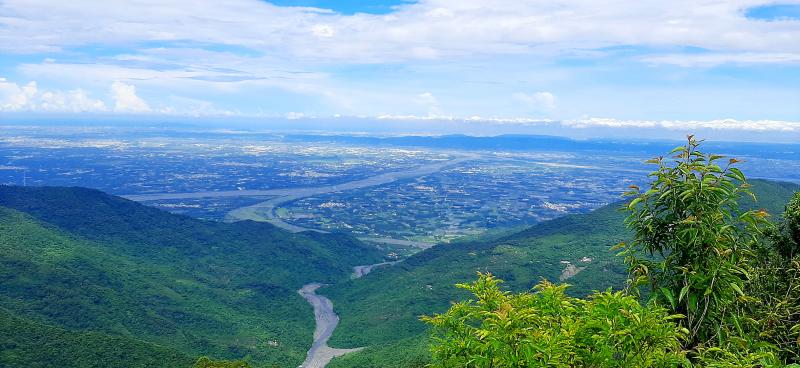
Photo: Mark Roche
The following morning I only had to ride several kilometers (uphill) to reach the trail head of Guangwang Mountain (觀望山, formally known as Dewen Mountain, 德文山). The trail is at the 2.5km marker on the Pingtung County Road No 31, the turn off is at the 7km marker on the No 24. Now at an altitude of 800m the air is fresh and just a little cooler than the lowlands to make the hike enjoyable without sweating profusely. It’s a very pleasant three-hour round trip to the peak at 1,246m, but the real reward is the view at the top. Individual buildings in Kaohsiung, some 50km away, can be picked out and the off-shore island of Siaoliouciou (小琉球) is also visible on a clear day.
COFFEE HERITAGE
After returning from the hike I stopped in at Karavayan (卡拉發樣咖啡屋), a wonderful little coffee shop that is right at the trail head for Guangwang Mountain. It offers some simple meals and ice cold drinks. Coffee is a major economic crop for the indigenous village of Dewen, also known as Tjukuvulj. It is cultivated over an area of 30 hectares. There are more than 20, century-old coffee plants left from the Japanese colonial era. The villagers protect them as a local treasure.
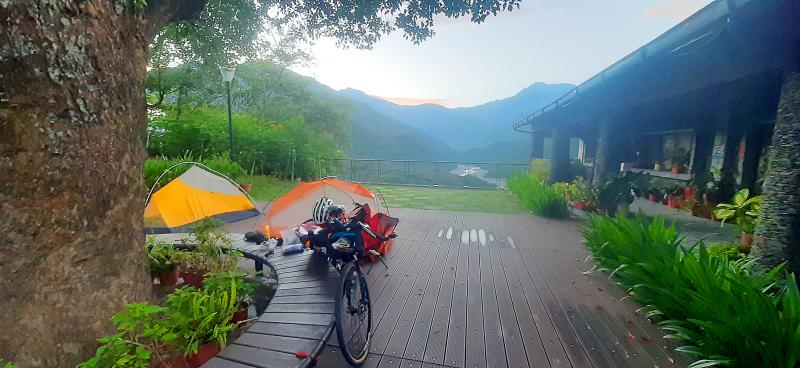
Photo: Mark Roche
I had a 3km ride further up the road to reach the trail head of Lover’s Lake (情人湖) — so-called because of its heart-shaped pool. The location is a little tricky to find (see GPS coordinates). After a 30-minute hike a turquoise pristine pool awaits. The water is so clean and cool I wanted to bottle it and take it home. With the temperature in the mid-30s and humid, it was difficult to leave.
After returning to the No 24 road riders have to cross the Wutai Valley Bridge. The bridge is a tourist attraction in itself and a marvel of engineering. It is 654 meters long and 74 meters high, the highest in Taiwan. There are viewing platforms on both sides.
It’s a 10km ride up to Shenshan Township (神山), famous for its slate buildings and fig jelly dessert. Most residents from Pingtung who travel to Shenshan do so as a day trip, but I would advise the visitor to spend the night there to truly appreciate it. A dinner of barbecued pork is reason enough to stay and Shen Shan Guest House (tel: (08) 7902206), at NT$1,800 for a double, was great value. There is no air-conditioning in the rooms as the night temperature is perfect — it’s several degrees cooler than the lowlands. If that isn’t enough reason to make it worthwhile then the morning views over the central mountains are breath-taking.
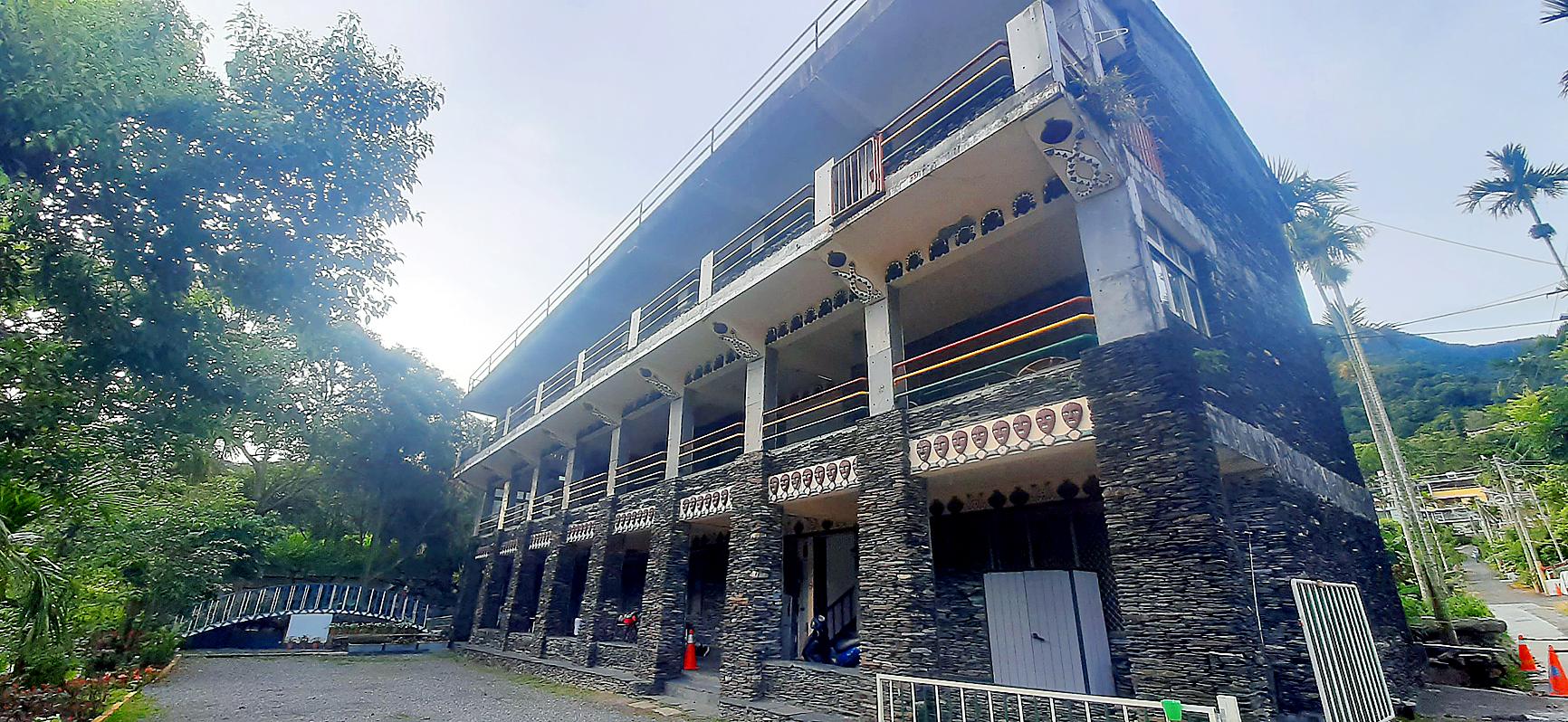
Photo: Mark Roche
The next morning I had one other item on the agenda: Shenshan Waterfall (神山瀑布). From the village the trail is around two-hours round-trip and well worth the effort. This is one of the easiest and most accessible waterfalls in Pingtung. After a short walk down a concrete path there is a stepped boardwalk and a rope bridge to cross to access different levels of the falls. Although swimming is not permitted here that shouldn’t deter the visitor.
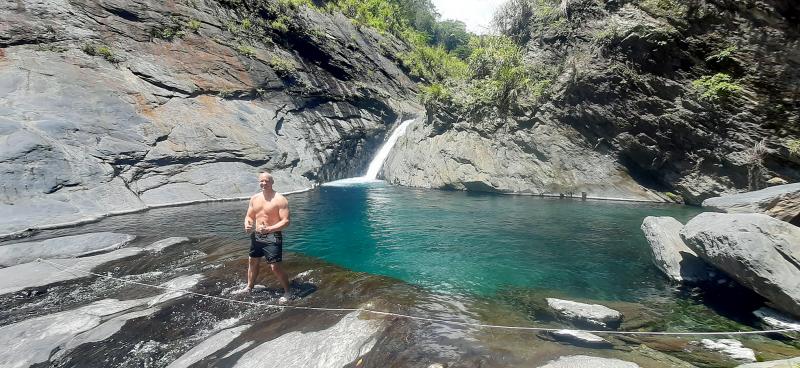
Photo: Mark Roche
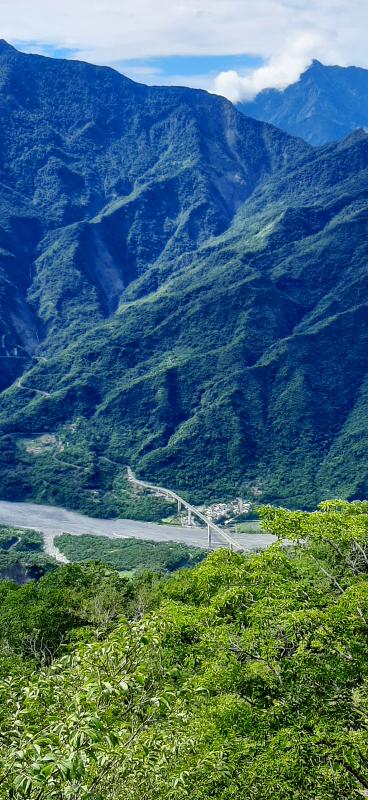
Photo: Mark Roche
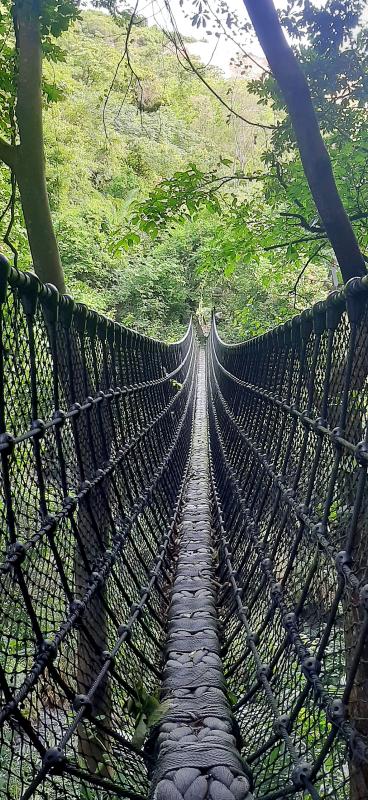
Photo: Mark Roche

This month the government ordered a one-year block of Xiaohongshu (小紅書) or Rednote, a Chinese social media platform with more than 3 million users in Taiwan. The government pointed to widespread fraud activity on the platform, along with cybersecurity failures. Officials said that they had reached out to the company and asked it to change. However, they received no response. The pro-China parties, the Chinese Nationalist Party (KMT) and Taiwan People’s Party (TPP), immediately swung into action, denouncing the ban as an attack on free speech. This “free speech” claim was then echoed by the People’s Republic of China (PRC),

Exceptions to the rule are sometimes revealing. For a brief few years, there was an emerging ideological split between the Democratic Progressive Party (DPP) and Chinese Nationalist Party (KMT) that appeared to be pushing the DPP in a direction that would be considered more liberal, and the KMT more conservative. In the previous column, “The KMT-DPP’s bureaucrat-led developmental state” (Dec. 11, page 12), we examined how Taiwan’s democratic system developed, and how both the two main parties largely accepted a similar consensus on how Taiwan should be run domestically and did not split along the left-right lines more familiar in

Specialty sandwiches loaded with the contents of an entire charcuterie board, overflowing with sauces, creams and all manner of creative add-ons, is perhaps one of the biggest global food trends of this year. From London to New York, lines form down the block for mortadella, burrata, pistachio and more stuffed between slices of fresh sourdough, rye or focaccia. To try the trend in Taipei, Munchies Mafia is for sure the spot — could this be the best sandwich in town? Carlos from Spain and Sergio from Mexico opened this spot just seven months ago. The two met working in the

Many people in Taiwan first learned about universal basic income (UBI) — the idea that the government should provide regular, no-strings-attached payments to each citizen — in 2019. While seeking the Democratic nomination for the 2020 US presidential election, Andrew Yang, a politician of Taiwanese descent, said that, if elected, he’d institute a UBI of US$1,000 per month to “get the economic boot off of people’s throats, allowing them to lift their heads up, breathe, and get excited for the future.” His campaign petered out, but the concept of UBI hasn’t gone away. Throughout the industrialized world, there are fears that